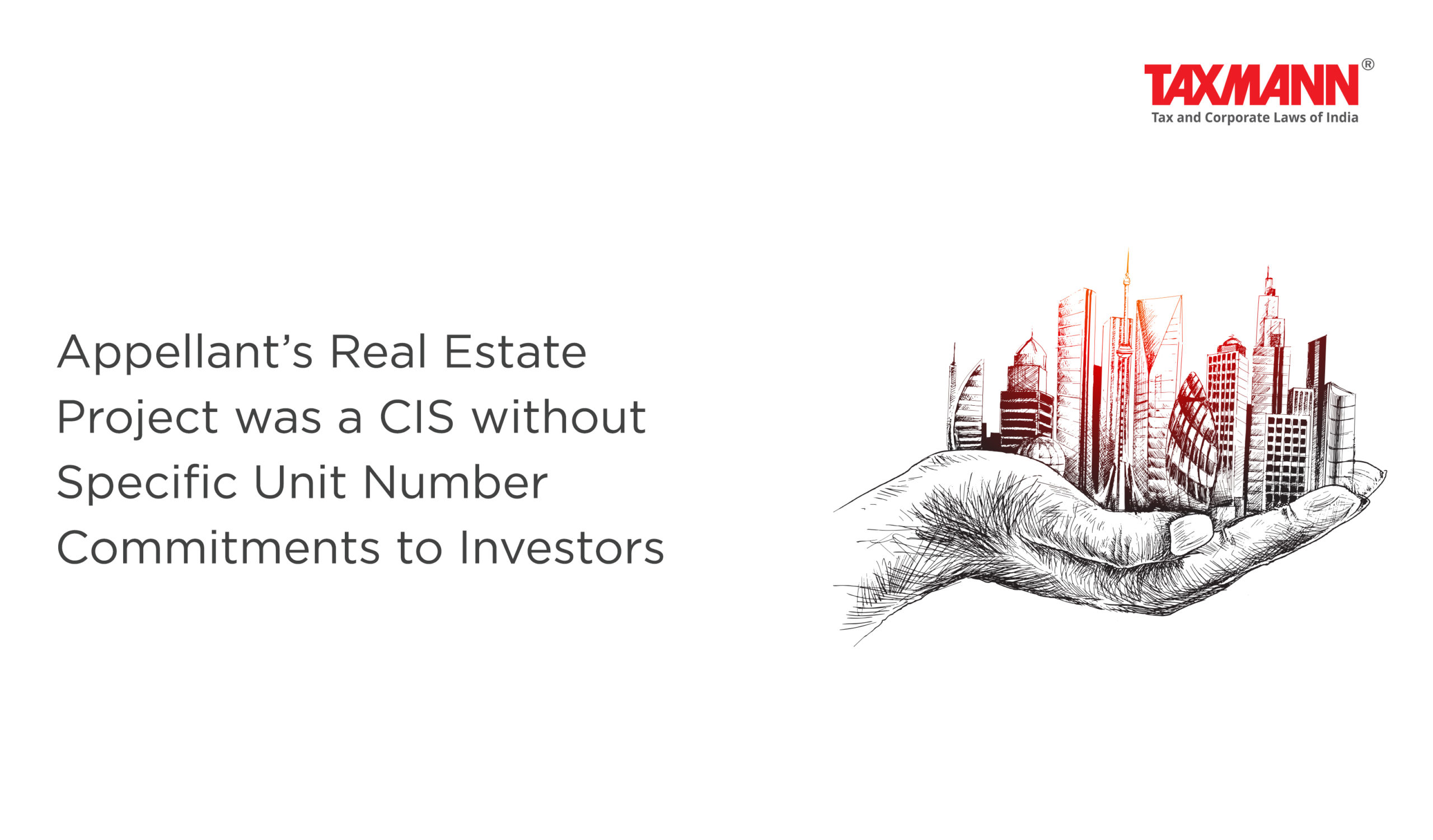Appellant’s Real Estate Project was a CIS without Specific Unit Number Commitments to Investors
- Blog|News|Company Law|
- 2 Min Read
- By Taxmann
- |
- Last Updated on 1 June, 2023

Case Details: MVL Ltd. v. Securities & Exchange Board India - [2023] 150 taxmann.com 285 (SAT-Mumbai)
Judiciary and Counsel Details
-
- Justice Tarun Agarwala, Presiding Officer, M.T. Joshi, Judicial Member
& Ms Meera Swarup, Technical Member - Amish Tandon, Ashwin Ankhad, Naresh Ratnani, Shantanu Mitra, Akash Menon & Ms Sukanya Banerjee, Advs. for the Appellant.
- Kevie Setalvad, Sr. Adv., Mihir Mody, Arnav Misra, & Mayur Jaisingh, Advs. for the Respondent.
- Justice Tarun Agarwala, Presiding Officer, M.T. Joshi, Judicial Member
Facts of the Case
In the instant case, the appellant, a real estate developer had sold IT/cyberspaces in its real estate project to 232 buyers under the assured return plan and to about 17 buyers under the construction link instalment plan. Consequently, an application for provisional registration was required.
Later, the SEBI took into consideration the contents of an application for provisional registration and concluded that the project was nothing but a Collective Investment Scheme (CIS) without registration of the same.
Thus, by the impugned order, the SEBI directed the appellant to wind up the existing CIS, to refund monies collected under the scheme and also restrained the appellant from accessing the securities market till the said CIS was wound up.
It was noted that, unlike the real estate transaction, in the instant case, there was no clearly demarcated area. Upon perusal of the floor plan, it was observed that the area allotted to each buyer did not match the floor plan. Also, layout plans/floor plans were not forming part of buyer agreements with buyers.
Further, it was noted that the application form for provisional registration also recited that the developer would not be bound to give any specific unit number of space to be allotted to buyers. Even the application made it clear that investors were making an application with the knowledge that they were not obtaining any specific unit of space. In the assured return agreement, provisions of buy-back were given.
It was also found that in some cases, clients were given a buy-back option wherein, investors would get 96% return while in some cases, the client was to get only 15.5% of the total investment.
This was contrary to the arguments of the appellant that it had prescribed a 5% simple interest on the total investment made by investors under the scheme. Consequently, against the direction of the SEBI, an appeal was preferred with the Securities Appellate Tribunal (SAT).
SAT Held
The SAT held that the scheme/project undertaken by the appellant was clearly a CIS. Further, the SAT held that the payment made by investors was pooled and utilized for the purpose of the said project and the contribution was with a view to making or receiving profit or income on property from such a scheme.
Therefore, the appeal against the order passed by the SEBI was to be set aside.
List of Cases Referred to
-
- P.G.F. Ltd. v. Union of India [2013] 31 taxmann.com 100/[2014] 125 SCL 243 (SC) (para 22).
Disclaimer: The content/information published on the website is only for general information of the user and shall not be construed as legal advice. While the Taxmann has exercised reasonable efforts to ensure the veracity of information/content published, Taxmann shall be under no liability in any manner whatsoever for incorrect information, if any.

Taxmann Publications has a dedicated in-house Research & Editorial Team. This team consists of a team of Chartered Accountants, Company Secretaries, and Lawyers. This team works under the guidance and supervision of editor-in-chief Mr Rakesh Bhargava.
The Research and Editorial Team is responsible for developing reliable and accurate content for the readers. The team follows the six-sigma approach to achieve the benchmark of zero error in its publications and research platforms. The team ensures that the following publication guidelines are thoroughly followed while developing the content:
- The statutory material is obtained only from the authorized and reliable sources
- All the latest developments in the judicial and legislative fields are covered
- Prepare the analytical write-ups on current, controversial, and important issues to help the readers to understand the concept and its implications
- Every content published by Taxmann is complete, accurate and lucid
- All evidence-based statements are supported with proper reference to Section, Circular No., Notification No. or citations
- The golden rules of grammar, style and consistency are thoroughly followed
- Font and size that’s easy to read and remain consistent across all imprint and digital publications are applied



 CA | CS | CMA
CA | CS | CMA
